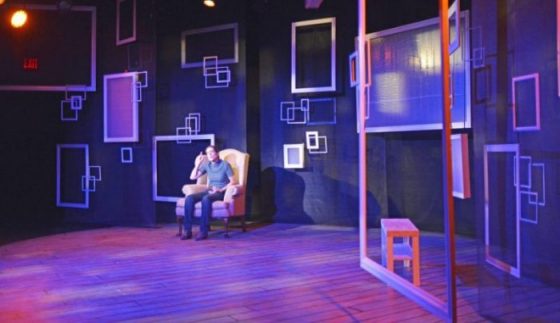
2.5 Minute Ride by Lisa Kron. Theatre Horizon, Norristown PA.
Buyer and Cellar by Jonathan Tollins. 1812 Productions, Philadelphia PA.
Two one-person plays light up the Philadelphia theater scene in the autumn of 2017.
2.5 Minute Ride is an autobiographical drama by Lisa Kron, best known as the playwright and lyricist of the musical Fun Home. Read that review here. Buyer and Cellar is a satirical comedy by Jonathan Tollins, author of Twilight of the Golds.
Both of them feature outstanding acting, by Leah Walton in the Kron piece and Dito van Reigersberg in the Tollins play.
Kron wrote 2.5 Minute Ride in 1998 as a performance vehicle for herself. She relates the story of her father, an aging Holocaust survivor with whom she travels back to Germany and Poland, interspersed with tales of growing up Jewish in America’s Midwest. Bear in mind that her father is not the father in Fun Home who committed suicide; that was the story of Alison Bechdel’s family, not of Kron’s.
Walton is disarmingly casual as she purports to show us slides of family photos. She points to an empty frame and all you see are flashing rectangles of light (as designed by Alyssandra Docherty) and gentle clicks from a projector (by Larry Fowler.) She is giving an informal lecture about how she’s preparing a video biography of her dad. Walton is especially winning as she frequently pauses and acknowledges the reactions of her audience.
Her story flits back and forth, freely associating in time and place. She tells varied stories about life as a Jew in Lansing Michigan (“People say ‘Merry Christmas’ and you tell them you’re Jewish and they say, ‘Well okay, you have a Merry Christmas’ as if you’re also Christian”) and of her family’s annual treks to an Ohio amusement park where her father enjoys a 2.5 minute roller coaster ride that terrifies her.
She and her dad travel to Auschwitz, where his parents were murdered, and she’s filled with conflicting emotions. What if she doesn’t feel anything, how to react if her father cries, should they pay an admission charge if there is one, should she buy anything at the gift shop? Her detailed descriptions of Auschwitz and neighboring Birkenau are spot on. (My family and I shared that experience.) Most haunting is her father’s job as a U.S. Army interrogator at the end of the war. As he judges the German person he is questioning, he feels doubts about guilt.
The play is a bit overlong and even my wife, who grew up Jewish in the Midwest, found the Ohio and Michigan scenes to become tiresome. Nor does Kron sufficiently tie the Midwest stories to the European ones. Still, we are entranced by her portrait of her father, her devotion to him, and her coming to grips with her heritage. Elaina Di Monaco’s direction captures the emotional power of Kron’s play.
In Buyer and Cellar we also meet a group of people by proxy, through the eyes of the solo performer. He is Dito van Reigersberg, a talented actor whom we’ve enjoyed in serious roles, including Shakespeare, and who also is known for his drag queen fictional chanteuse “Martha Graham Cracker.” He plays Alex, an unemployed actor who is hired to manage the stores in Barbra Streisand’s private shopping mall in the basement of her Malibu estate. It’s a real place, described in Streisand’s real book, My Passion for Design, but the rest of this story is fiction.
His boyfriend Barry, a struggling screenwriter, becomes jealous of Alex’s infatuation with Barbra, and he, through Alex’s telling, voices harsh criticisms of the star. “Yes, her father died and that’s terrible, and yes, she lived in a cramped apartment and her stepfather never liked her, but she was famous and had the world at her feet by the time she was 19. At what point is that not enough for her?”
This play is not a glorification of everything Barbra but, rather, a deconstruction of her persona and her career. It reminds me of a Seth Rudetsky lecture where he comments on every detail of songs and shows. Dito charms us with his warmth as he imagines a personal relationship with the star. When he quotes her, he suggests her voice but never attempts a real imitation.
An unexpected pleasure is the character’s self-awareness (“This is a work of fiction. You know that, right?”) and his realization that his fantasy is foolish. The play is light comedy but it turns poignant when Alex asks his imagined Streisand what she’d desire most and she replies, “I’d be pretty and everyone would know it and I’d think so, too.” And the play turns dark when Alex compulsively picks a fight with Streisand which causes the imaginary her to fire him.
The set by Christopher Haig is plain: a single chair, a cart holding liquor bottles, and a record player. Dan O’Neil’s direction is equally simple. Thus all the burden is on Reigersberg, and his charm makes the play worthwhile.
In closing, I’d like to introduce you to Kron’s gentle humor, and prove that her writing goes far beyond depression and suicide. Please check out this brief excerpt from her short story The Lost Diaries of Queen Esther:
“These are journal entries from the actual diaries of Queen Esther. They have only recently been made available by biblical scholars so if you haven’t heard about them that’s possibly why. They were unearthed about two and a half years ago in a storage locker in Babylon (Long Island), which seems a little odd, I know. This first entry seems to have been written in the Royal Harem. Well, anyway, it’s written on Royal Harem stationery. It’s dated September, 478 BCE, which is kind of interesting that they used BCE at that time but, whatever….”
Below, Von Reigersberg in Buyer and Cellar, photo by Mark Garvin:
